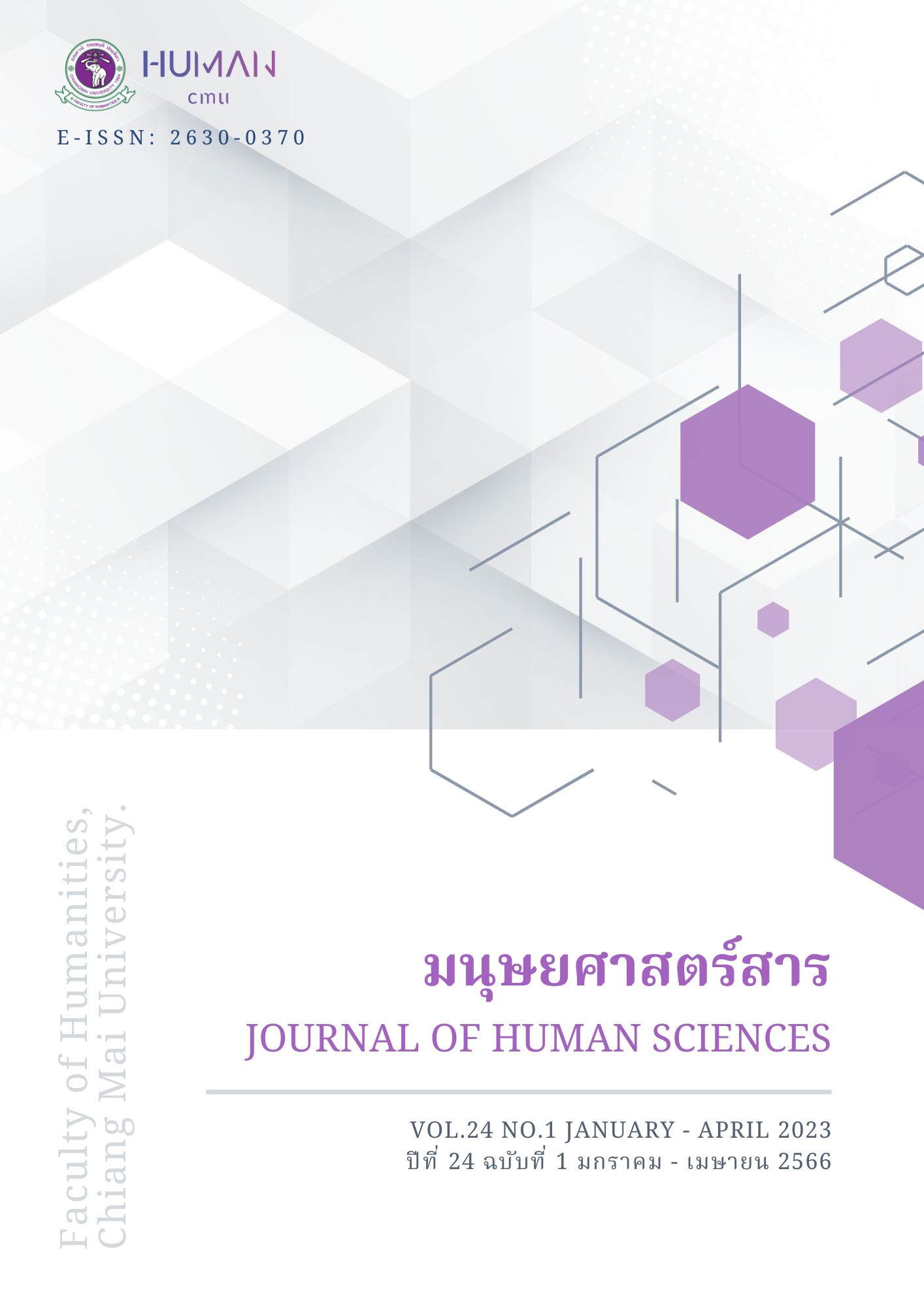ปัจจัยที่มีต่อค่านิยมทางจริยธรรมของวัยรุ่นไทย
Main Article Content
บทคัดย่อ
การวิจัยนี้มีวัตถุประสงค์ 1) เพื่อศึกษาค่านิยมทางจริยธรรมของวัยรุ่นไทย 2) เพื่อศึกษาปัจจัยที่มีผลต่อค่านิยมทางจริยธรรมของวัยรุ่นไทย 3) เพื่อศึกษาหาแนวทางแก้ไขปัญหาค่านิยมทางจริยธรรมที่ไม่เหมาะสมของวัยรุ่นไทย กลุ่มตัวอย่างที่ใช้ในการวิจัยครั้งนี้คือ นักศึกษาปริญญาตรี มหาวิทยาลัยเชียงใหม่ ปีการศึกษา 2564 คำนวณหาขนาดตัวอย่างตามสูตรของ Yamane (Yamane, 1973) ที่ระดับนัยสำคัญทางสถิติ 0.05 ได้จำนวน 396 คนและทำการสุ่มแบบแบ่งชั้นภูมิ (stratified sampling) โดยแบ่งตามสัดส่วน จำแนกตามกลุ่มสายสาขาวิชาเป็น 3 กลุ่ม คือ สายสาขาวิชาวิทยาศาสตร์สุขภาพ สายสาขาวิชาวิทยาศาสตร์และเทคโนโลยี และสายสาขาวิชามนุษยศาสตร์และสังคมศาสตร์ ซึ่งเป็นตัวแทนของวัยรุ่นไทยเพื่อตอบแบบสอบถาม และเลือกกลุ่มตัวอย่างแบบเจาะลง (Purposive sampling) จำนวน 20 คนแบ่งออกเป็นเพศชาย 10 คนและเพศหญิง 10 คน เพื่อตอบแบบสัมภาษณ์เชิงลึก เครื่องมือที่ใช้ในการเก็บรวบรวมข้อมูลคือ แบบสอบถามและแบบสัมภาษณ์เชิงลึก สถิติที่ใช้ในการวิเคราะห์ข้อมูลคือ การแจกแจงความถี่ (Frequency) ร้อยละ (Percentage) ส่วนเบี่ยงเบนมาตรฐาน (S.D.) สัมประสิทธิ์สหสัมพันธ์ระหว่างปัจจัย การทดสอบ t-test และ F-test
ผลการวิจัยพบว่า 1) ค่านิยมทางจริยธรรมของวัยรุ่นไทย โดยภาพรวมค่านิยมทั้ง 4 ด้าน อยู่ในระดับเห็นด้วยมาก 2 ด้าน คือ ด้านระเบียบวินัยและด้านความซื่อสัตย์ และอยู่ในระดับเห็นด้วยปานกลาง 2 ด้าน คือ ด้านบริโภคนิยมและด้านความเสียสละ 2) ปัจจัยที่มีต่อค่านิยมทางจริยธรรมของวัยรุ่นไทยได้แก่ อาชีพของผู้ปกครองมีผลต่อค่านิยมทางจริยธรรมด้านบริโภคนิยม เกรดเฉลี่ยมีผลต่อค่านิยมทางจริยธรรมด้านระเบียบวินัยและความซื่อสัตย์ เพศมีผลต่อค่านิยมทางจริยธรรมด้านความเสียสละ ส่วนปัจจัยส่วนบุคคลด้านอื่นๆ ไม่มีผลต่อค่านิยมทางจริธรรมที่แตกต่างกัน 3) แนวทางแก้ไขปัญหาค่านิยมทางจริยธรรมที่ไม่เหมาะสมของวัยรุ่นไทย ได้แก่ ครอบครัว สถาบันการศึกษา การจัดกิจกรรมส่งเสริมคุณธรรมจริยธรรม และสื่อมวลชน มีบทบาทในการปลูกฝังค่านิยมทางจริยธรรม
Article Details

อนุญาตภายใต้เงื่อนไข Creative Commons Attribution-NonCommercial-NoDerivatives 4.0 International License.
เอกสารอ้างอิง
กรมวิชาการ กระทรวงศึกษาธิการ. (2534). คู่มือหลักสูตรประถมศึกษาพุทธศักราช 2521 (ฉบับปรับปรุง พ.ศ.
. โรงพิมพ์คุรุสภา.
คณะอนุกรรมการส่งเสริมการปกป้องคุ้มครองเด็กและเยาวชนในการใช้สื่อออนไลน์และคณะกรรมการส่งเสริม
การพัฒนาเด็กและเยาวชนแห่งชาติ. (2561). ยุทธศาสตร์ส่งเสริมและปกป้องคุ้มครองเด็กและเยาวชน
ในการใช้สื่อออนไลน์ พ.ศ. 2560-2564. กระทรวงการพัฒนาสังคมและความมั่นคงของมนุษย์.
ธนพงศ์ มงคล (2544). ความคิดเห็นของผู้ปกครองเกี่ยวกับการพัฒนาจริยธรรมในโรงเรียนมงฟอร์ตวิทยาลัย แผนก
ประถม [วิทยานิพนธ์ศึกษาศาสตรมหาบัณฑิต, มหาวิทยาลัยเชียงใหม่].
https://tdc.thailis.or.th/tdc/browse.php?option=show&browse_type=title&titleid=78632
ธันยพร บุษปฤกษ์. (2551). พฤติกรรมเชิงจริยธรรมของเยาวชนในสังคมไทย : กรณีศึกษามหาวิทยาลัยเทคโนโลยี
ราชมงคลพระนคร. [วิทยานิพนธ์ศิลปศาสตรมหาบัณฑิต (สาขาไทยศึกษา), มหาวิทยาลัยรามคำแหง].
https://tdc.thailis.or.th/tdc/browse.php?option=show&browse_type=title&titleid=46098
นวลลออ แสงสุข. (2544). การศึกษาพฤติกรรมเชิงจริยธรรมของนักเรียนชั้นมัธยมศึกษาตอนต้น โรงเรียนสาธิต
มหาวิทยาลัยรามคำแหง. มหาวิทยาลัยรามคำแหง.
บรรเทา กิตติศักดิ์ (2527). เอกสารประกอบการสอนวิชาจริยธรรมทางการศึกษา. ภาควิชาการศึกษา
คณะศึกษาศาสตร์ มหาวิทยาลัยเชียงใหม่.
ยูโกะ อิโต. (2552). การเปรียบเทียบค่านิยมทางจริยธรรมระหว่างนักเรียนชั้นประถมศึกษาชาวไทยกับชาวญี่ปุ่น.
[วิทยานิพนธ์ศิลปศาสตรมหาบัณฑิต, มหาวิทยาลัยเชียงใหม่].
https://cmudc.library.cmu.ac.th/frontend/Info/item/dc:111458
สุวิมล ว่องวาณิช. (2560). การติดตามและประเมินการส่งเสริมค่านิยมของคนไทย. เจริญผลกราฟฟิค.
สำนักวิจัยและพัฒนา สถาบันพระปกเกล้า. (2554). การศึกษาเพื่อเสริมสร้างความซื่อตรงในสังคมไทย. สำนักวิจัย
และพัฒนา สถาบันพระปกเกล้า.
อภิรัตน์ ไชยอนันต์. (2546). ค่านิยมและการปฏิบัติตนด้านคุณธรรมจริยธรรมตามแนวทางพระพุทธศาสนาของ
เยาวชนยุคใหม่ในจังหวัดเชียงใหม่. [วิทยานิพนธ์ศิลปศาสตรมหาบัณฑิต, มหาวิทยาลัยราชภัฏเชียงใหม่].
https://tdc.thailis.or.th/tdc/browse.php?option=show&browse_type=title&titleid=21597
Parker, Dewitt H. (1986). The Philosophy of Value. Greenwood Press.
Perry, Ralph Barton. (1954). Realms of Value: A Critique of Human Civilization.
Harvard University Press.


